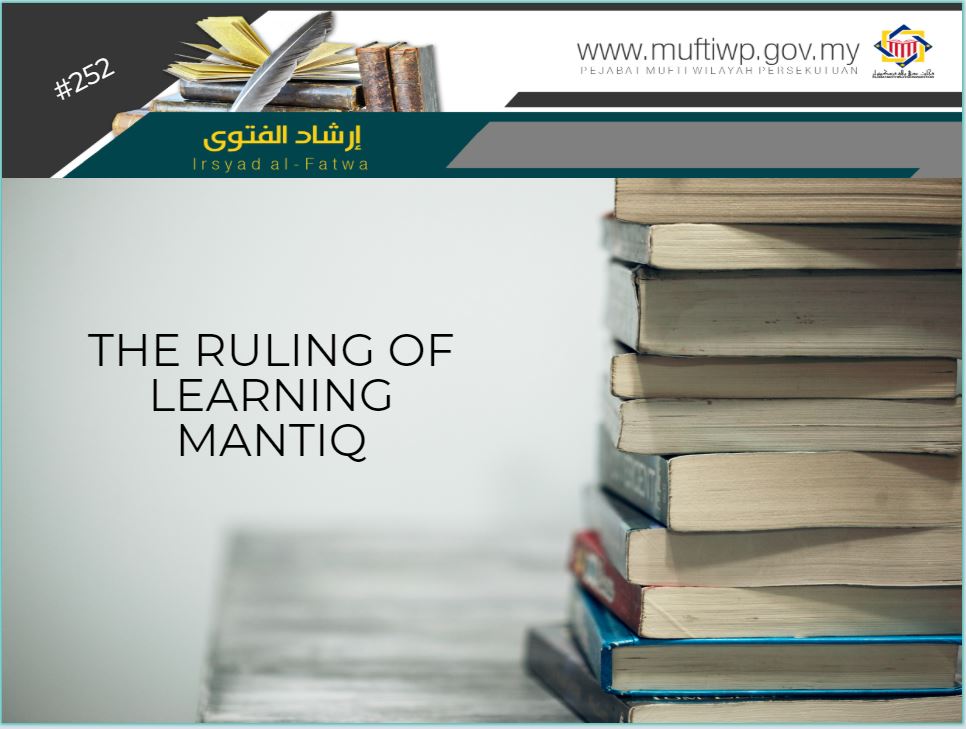Question:
What is the ruling for learning mantiq or logic?
Answer:
Alhamdulillah, praise and thanks to Allah for the many countless blessings He has blessed us all with. Blessings and salutations to the Prophet Muhammad PBUH, his wives, his family, companions and all those that follow his teachings to the day of judgement.
A Brief History of Mantiq
Mantiq is a type of knowledge or discipline that was first systematically arranged by Aristotle, the great Greek philosopher. When Islam was spread to the Arabian Peninsula and was extended extensively to the east and west, the development of science was also progressing rapidly. The peak for knowledge and study occurred during the reign of the 'Abbasid Caliphate. During this period, Greek philosophy is intensively translated into Arabic, and this includes mantiq knowledge. Since then, mantiq knowledge has been studied attentively by Muslim philosophers such as Abdullah Ibn Al-Muqaffa ', Yaqub Ibn Ishaq Al-Kindi, Al-Farabi, Ibn Sina, Imam al-Ghazali and Ibn Rusyd.
The Definition of Mantiq
There are several definitions regarding the knowledge of mantiq by Islamic scholars, the most famous opinion states:
آلة قانونية تعصم مراعاتها الذهن عن الخطأ في الفكر
“A systematic wasilah or methodology of protecting someone from any wrongful way of thinking.” (Refer Ahmad ibn ‘Umar al-Hazimi, Al-Syarh al-Mukhtasar li al-Sullam al-Munawraq, 1/12)
While al-‘Atthar defines it as a knowledge that through it the right can be differentiates from the wrong. Thus, it is qawaid and usul that bring him to the correct or wrongful thinking.
There are several other names for mantiq, such as Mi’yar al-‘Ilm and Mizan al-Uqul. In truth, it is a collection of the laws of thinking (qawanin ‘aqliyyah), that, if followed will enable someone to come to a right conclusion, free from any mistakes. (Refer Ahmad ibn ‘Umar al-Hazimi, Al-Syarh al-Mukhtasar li al-Sullam al-Munawraq, 1/12)
To put it simply, there are a few important discussions for mantiq, and it is divided into two important topics which are tasawwur and tasdiq. Tasawwur includes the methodology of defining and classification of things, while tasdiq discusses the methodology of deductive reasoning (qiyas).
The Importance of Mantiq
Mantiq is a branch of knowledge that is used as an important tool in understanding the parables in classical books of Islam (turath), in addition to nahu, sorof, balaghah and others. Imam al-Akhdhari (1512-1575 M) in Matan Sullam al-Munawraq emphasize the importance of mantiq by saying:
فَالمَنْطِقُ لِلْجَنَانِ** نِسْبَتُهُ كَالنَّحْوِ لِلِّسَانِ
فَيَعْصِمُ الأَفْكَارَ عَنْ غَيِّ الخَطَا** وَعَنْ دَقِيقِ الفَهْمِ يَكْشِفُ الغِطَا
“Mantiq for the mind is like nahu for speaking (language), it protects thought from mistakes and reveals ambiguity through deep understanding”
The importance of mantiq is also stated by Imam Al-Ghazali through his words written in the prolegomena (muqaddimah) of Al-Mustasfa:
وَمَنْ لَا يُحِيطُ بِهَا فَلَا ثِقَةَ لَهُ بِعُلُومِهِ أَصْلًا
“And whoever is not well-versed in mantiq, then his knowledge is doubtful”
For mantiq, according to him is the introduction of all types of knowledge not just the introduction to usul fiqh. (See Al-Mustasfa, 1/10)
While Imam Ibn Hajar al-Haitami wrote the opinion of Imam al-Qarafi that states that the mastery of mantiq is a condition for ijtihad. (See Al-Fatawa al-Fiqhiyyah al-Kubra, 1/51)
The Ruling of Learning Mantiq
However, there are differing opinion by Islamic scholars regarding the ruling of learning mantiq that has been assimilated with deviant philosophical elements.
Imam al-Akhdhari further wrote:
وَالخُلْفُ فِي جَوَازِ الاِشْتِغَالِ ** بِهِ عَلَى ثَلاَثَةٍ أَقْوَالِ
فَابْنُ الصَّلاَحِ وَالنَّوَاوِي حَرَّمَا ** وَقَالَ قَوْمٌ يَنْبَغِي أَنْ يُعْلَمَا
وَالقَوْلَةُ المَشْهُورَةُ الصَّحِيحَةْ ** جَوَازُهُ لِكَامِلِ القَرِيحَةْ
مُمَارِسِ السُّنَّةِ وَالكِتَابِ ** لِيَهْتَدِي بِهِ إِلَى الصَّوَابِ
There are differing opinions regarding the issue of learning mantiq (that has assimilated with philosophy), and it is divided into three opinions; Imam Ibn Solah and Imam al-Nawawi prohibits it while some scholars hold the opinion that it is obligatory, while the famous and strongest opinion of Islamic scholars said that it is permitted to learn mantiq for perfection of thoughts. Furthermore, it is also permitted to know about the Quran and al-Sunnah to enable him to arrive at the truth.
The phrase يَنْبَغِي أَنْ يُعْلَمَا from the above statement can be understood to be defined with two meanings; which is collective obligation (fardu kifayah), the same as the opinion of Imam al-Ghazali, or the second meaning is it is sunnah.
The main point that we want to emphasize is the differing of opinions among Islamic scholars is only for learning mantiq that has been assimilated with deviant philosophical elements. (Refer Syeikh ‘Ali Jum’ah, al-Bayan lima Yushghilu al-Azhan, 1/60). This is the reason why Sheikhul Islam Ibnu Taimiyyah wrote a book Al-Raddu ‘ala al-Manthiqiyyin to dispute the deviant mantiq teachings.
Whereas, for mantiq knowledge that has not been assimilated with philosophical elements, the permissibility of learning it is agreed by all Islamic scholars. (Refer Ahmad ibn ‘Umar al-Hazimi, Al-Syarh al-Mukhtasar li al-Sullam al-Munawraq, 1/17). This includes the learning of books and important mantiq knowledge such as Mukhtasar by al Sanusi, Syamsiyah by Abi al Hasan al-Qazwini, Matan Isaghuji, Matan Sullam al-Munawraq and Tahzib al-Mantiq by Imam Sa’duddin al-Taftazani.
Conclusion
In conclusion, we hold the opinion that it is permitted to learn mantiq that has not been assimilated with philosophical elements, and it can also be considered as sunnah, and this is the opinion of most of the early and contemporary Islamic scholars.
However, to learn mantiq that has been assimilated with doubtful or deviant philosophical elements, it is prohibited except for those with strong intellect and deep understanding of the Quran and al-Sunnah, so that he can differentiate between the right and the wrong of the knowledge. Wallahua’lam.


